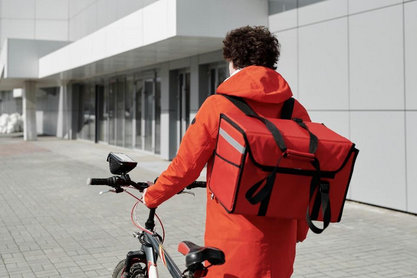Future Key Data on Last-Mile Logistics in France
The last-mile delivery sector in France has experienced strong growth in recent years. This market was valued at €1.1 billion in 2016 and is expected to reach €2.6 billion by 2025.
This growth is partly driven by the rise of e-commerce, further accelerated by the COVID-19 pandemic. According to the latest figures from the FEVAD (Federation of E-Commerce and Distance Selling), 73.3% of French consumers made an online purchase in 2024.
This high level of activity accounts for 30% of urban road occupancy and 25% of CO₂ emissions in cities.
Regulatory Developments in Sustainable Logistics
As a result, last-mile logistics are increasingly under the scrutiny of public authorities, and regulations are being implemented to make the sector more environmentally friendly and reduce urban congestion:
- Since January 2025, Low Emission Zones (LEZs) restrict the circulation of Crit’Air 3 vehicles during certain hours in major French cities. This measure aims to improve urban air quality by limiting the most polluting vehicles, directly impacting urban delivery operations.
- At the European level, the 2019/1161 directive, also known as the “Clean Vehicles Directive,” mandates minimum quotas of low-emission vehicles in public transport contracts, encouraging the adoption of green delivery vehicles.
Initiatives for Sustainable Urban Logistics
To address environmental and regulatory challenges, various initiatives have been developed by companies and industry players, such as:
- Shared logistics flows: Delivery pooling between different stakeholders to reduce the number of vehicles on the road, thus lowering the overall carbon footprint.
- Digitalized deliveries: Fully digital systems for tracking shipments from pickup to final delivery, improving efficiency and reducing emissions linked to missed or inefficient deliveries.
- Electric vehicles: Adoption of electric delivery vehicles.
- Cargo bikes: Cycle logistics using cargo bikes and trailers as a sustainable alternative to traditional transport methods.
- Multi-modal sustainable delivery methods: For example, in Lyon (France), the company GEODIS combines river transport with electric bicycle deliveries in the city center.
- Out-of-home deliveries: Using pickup points or automated lockers to consolidate deliveries, reduce the number of addresses to be served, decrease the number of vehicles on the road, optimize delivery routes, and minimize empty returns by collecting customer returns.
A joint commitment from public authorities, businesses, and consumers is essential to tackle this major environmental challenge.

Les Échos Capital Finance. (n.d.). Last-mile delivery: A booming market.
Available at: https://capitalfinance.lesechos.fr/analyses/dossiers/dernier-kilometre-un-marche-en-effervescence-143617
Journal du Net. (n.d.). Last-mile delivery: A key challenge for the logistics sector.
Available at: https://www.journaldunet.com/retail/1539265-le-dernier-kilometre-un-enjeu-cle-pour-le-secteur-de-la-logistique/
Les Échos Capital Finance. (n.d.). Last-mile delivery: A booming market.
Available at: https://capitalfinance.lesechos.fr/analyses/dossiers/dernier-kilometre-un-marche-en-effervescence-143617
Youmatter. (n.d.). LEZ and urban logistics: Transforming last-mile transport into a sustainable model.
Available at: https://youmatter.world/fr/categorie-economie-business/zfe-logistique-urbaine-transformer-transport-dernier-kilometre-durable/
Representation of the European Commission in France. (n.d.). Mobility and transport in France.
Available at: https://france.representation.ec.europa.eu/mobilites-et-transport_frLe Monde. (2023, October 26). In Lyon, carbon-free delivery relies on the river.
Available at: https://www.lemonde.fr/economie/article/2023/10/26/a-lyon-la-livraison-decarbonee-passe-par-le-fleuve_6196588_3234.html
